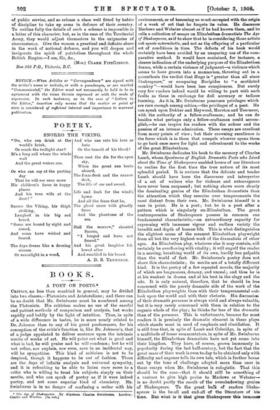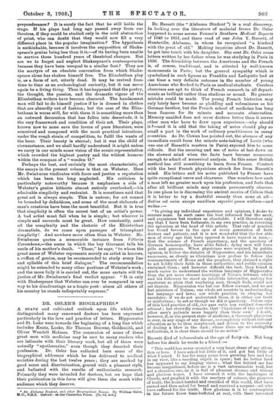BOOKS.
A POET ON POETS.*
Cnincs, no less than mankind in general, may be divided into two classes,—Platonists and Aristotelians ; and there can be no doubt that Mr. Swinburne must be numbered among the Platonists. His criticism makes no use of the careful and patient methods of comparison and analysis, but works rapidly and boldly by the light of intuition. Thus, in spite of a wide difference in tastes, he is more nearly related to Dr. Johnson than to any of his great predecessors, for his conception of the critic's function is, like Dr. Johnson's, that of a judge appointed to deliver sentence upon the intrinsic merits of works of art. He will point out what is good and what is bad, he will praise and he will condemn ; but be will not refine, nor explain, nor even, save in an incidental way, will he sympathise. This kind of criticism is not to be despised, though it happens to be out of fashion. These are the days of infinite analysis and universal sympathy, and it is refreshing to be able to listen once more to a critic who is willing to treat his subjects simply on their merits, and who can speak of poetry as if 'it were indeed poetry, and not some superior kind of chemistry. Mr. Swinburne is in no danger of confusing a writer •with his • The Ate at Shak.speare. By stIgestuan awls& Rarinburna, London: Matto and Winch's. [Ga. pet.] environment, or of becoming so much occupied with the origin of a work of art that he forgets: its value. He discusses Marlowe and Webster almost as if he had known them, and he calls a collection of essays on Elizabethan dramatists The Age of Shakespeare, asif to show that he isoonsidering those artists sub specits• aeternitatis, and not as the offspring of a particular set of conditions in time. The defects of his book would certainly have been avoided by an unsparing use of the com- parative method: It would. have contained, for instance, a clearer indication of the underlying purpose of the Elizabethan drama, while a certain violence of judgment—a violence which seems to have grown into a mannerism, throwing out in a parenthesis the verdict that Hugo is " greater than all since Shakespeare," or comparing Euripides to "a mutilated monkey "—would have been less conspicuous. But surely very few readers indeed would be willing to part with such faults as these in exchange for dull accuracy or tedious learning. As.it is, Mr. Swinburne possesses privileges which are rare enough among mitics,—the privileges of a poet. He can speak upon Dekker and Heywood, Marston and Tourneur, with the authority of a. fellow-craftsman; and he can do besides what perhaps only a fellow-craftsman could accom- plish,—he can inspire his readers with the ardour and the passion of an intense admiration. These essays are excellent from many points of view ; but their crowning excellence is the force which is in them that compels whoever opens them to go back once more for light and refreshment to the works of the great .Elizabethans.
Mr. Swinburne dedicates his book to the memory of Charles Lamb, whose Specimens of English Dramatic Poets who Lived about the Time of Shakespeare enabled lovers of our literature to realise for the first time the true nature of its most splendid period. It is curious that the delicate and tender Lamb should have been the discoverer and interpreter of a set of writers who for violence and extravagance have never been surpassed ; but nothing shows more clearly the dominating genius of the Elizabethan dramatists than the attraction which they exercise over temperaments the moat distant from their own. Mr. Swinburne himself is a case in point. He is a poet ; but he is a poet after a pattern which is singularly un-Elizabethan. The great contemporaries of Shakespeare possess in common one fundamental characteristic,—an extraordinary capacity for expressing with immense vigour and endless variety the breadth and depth of human life. This is what distinguishes the slightest scene of the meanest Elizabethan playwright from all but the very highest work of the dramatists of other ages. An Elizabethan play, whatever else it may contain, will certainly be overflowing with vitality ; it will engulf the reader in a moving, breathing world of its own, hardly less palpable than the world of fact. Mr. Swinburne's poetry does not share this characteristic ; its merits are of a totally different kind. It is the poetry of a few repeated moods, the majority of which are languorous, dreamy, and unreal ; and thus he is at his weakest in drama and at his best in the elegy and the ode. It is only natural, therefore, that he should be less concerned with the purely dramatic side of the work of the Elizabethan playwrights than with their temperamental out- look upon the world and with their rhetoric. His discussion of their dramatis personae is always vivid and always valuable, but it is very rarely concerned with them in relation to the organic whole of the play; he thinks far less of the dramatis than of the personae. This is unfortunate, because for most readers it is precisely the dramatic element in these plays which stands most in need of emphasis and elucidation. It is still true that, in spite of Lamb and Coleridge, in spite of a multitude of lesser commentators, in spite of Mr. Swinburne himself, the Elizabethan dramatists have not yet come into their kingdom. They have, of course, grown immensely in popularity during the last half-century, but the fact that the great mass of their work is even to-day to be obtained only, with difficulty and expense tells its own tale, which is further borne out by the tone of Challenge adopted more than once in these essays when Mr. Swinburne is eulogistic. That this should be the case—that it should still be. something of a venture to, give high praise to Marlowe or Webster— is no doubt partly 'the-remit of the overshadowing genius of Shakespeare. To the great bulk of readers Shrtice- apeare is the be-all and end-all cif the literature of kiss time. But what is it that gives -Shakespeare this innnexuar preponderance P It is surely the fact that he still holds the stage. If his plays had long ago passed away from our theatres, if they could be studied only in the cold abstraction of print, who can doubt that they would now fill a very different place in the popular imagination P The hypothesis is unthinkable, because it involves the supposition of Shake- speare's genius being less than it is,—of its having been unable to survive three hundred years of theatrical changes. But are we to forget and neglect Shakespeare's contemporaries because they have been unequal to a similar feat P They are the martyrs of an obsolete convention from which Shake- speare alone has shaken himself free. The Elizabethan play is, as a form of art, utterly dead. It may be revived from time to time as an archaeological curiosity, but it can never again be a living thing. Thus it has happened that the poetry, the thought, the passion, and the dramatic vigour of the Elizabethan writers have become obscured. The handsomest man will fail to do himself justice if he is dressed in clothes that are absurdly out of fashion; but the case of the Eliza- bethans is worse still, for with them it is something more than an outward decoration that has fallen into desuetude, it is the very framework and condition of their art. Their plays, known now to none save the lovers of pure literature, were conceived and composed with the most practical intentions, under the rough strain of competition, to fulfil the wants of the hour. Their beauty is eternal; but it was the child of circumstance, and we shall hardly understand it aright unless we carry in our minds some vision of the scenic representation which crowded the highest poetry and the wildest humour within the compass of a " wooden 0."
Perhaps the best, and certainly the most characteristic, of the essays in the present volume is that on Webster. Here Mr. Swinburne vindicates with force and justice a reputation which has been too long neglected. His criticism is particularly noteworthy because it emphasises a side of Webster's genius hitherto almost entirely overlooked,—his admirable simplicity and restraint. It is sometimes said that great art is always simple. This is untrue; for art cannot be bounded by definitions, and some of the most elaborate of man's creations have been the most beautiful. But it is true that simplicity is often the surest test of an artist's power. A bad artist must fail when he is simple ; but whoever is simple and succeeds must be great. How constantly, amid all the complexity and the rhetoric of the Elizabethan dramatists, do we come upon passages of triumphant simplicity! And nowhere more often than in Webster. Mr. Swinburne quotes a memorable instance from Vittoria Corombona,—the scene in which the boy Giovanni tells his uncle of his mother's death. " Those," he says, " to whom the great name of Webster represents merely an artist in horrors, a ruffian of genius, may be recommended to study every line and syllable of this brief dialogue." The recommendation might be extended to many other portions of Webster's work ; and the more fully it is carried out, the more certain will the justice of Mr. Swinburne's final verdict appear. "It is only with Shakespeare that Webster can ever be compared in any way to his disadvantage as a tragic poet : above all others of his country he stands indisputably supreme."

























































 Previous page
Previous page